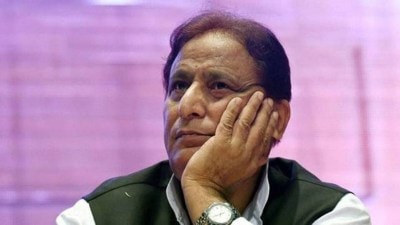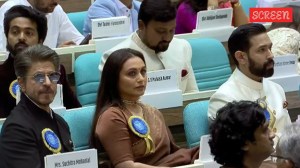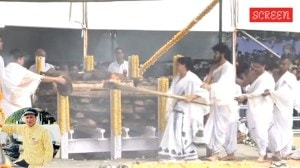Ear to the ground
May 2: When the Congress-led Democratic Front government appointed senior NCP leader Sudhakarrao Naik as the head of the Water Conservatio...

May 2: When the Congress-led Democratic Front government appointed senior NCP leader Sudhakarrao Naik as the head of the Water Conservation Council, he immediately accepted the assignment as it was his own brainchild. But Naik refuses to go to the office and instead works from home, it seems.
Alarmed by the acute shortage of drinking water in around 20,000 villages, Naik had drawn the ambitious plan with the contention that the government could tackle the shortage, provided a scientific approach is adopted. So he set up the Water Conservation Council and its head was given the cabinet rank mainly to ensure jumping over all bureaucratic hurdles. But during the Sena-BJP rule, by and large the post remained vacant. The party even offered the post and a plush office to Naik, but on the condition that he joined Shiv Sena. Naik declined to oblige the alliance.
Now, under the present government, Naik expected a similar gesture. But it turned out to be worse. With the post in hand, Naik was told he had been accommodated on the 13th floor of the New Administrative Building, across the road from Mantralaya. However, he was stunned when he visited his office. While there was no staff, there was neither a table nor the chair in the chamber. Since then he has decided not to visit the office again.
The official and personal residence, as well as Mantralaya office of the Minister of State for Home, Kripashankar Singh, is always brimming with visitors. While non-official visitors have a grievance against one or the other police station or come for a letter of recommendation, official visitors, mostly from the Home and the Food and Drug Administration Department, call on him for guidance. In addition, a section of the police officials meet Kripashankar Singh about their transfers and postings. While some approach him personally, others seek political intervention.
But why do these details matter? Because as per the Maharashtra Civil Service and Discipline Rules meeting a cabinet member directly amounts to breach of discipline and can attract severe punishment. Of course, after their work is done, they call on him to express sincere thanks and some of them even present him with sweets. So far, Kripashankar Singh had not initiated stringent measures on humanitarian grounds. But Singh was shocked when a police inspector, whose transfer was stalled by him, presented a box containing currency notes. Initially, the minister thought it was a sweet box, which he normally distributes among the visitors. But this time when I opened the box, he was shocked and has taken a serious note of it.
At a juncture when important democratic institutions have been completely politicised, assembly speaker Arun Gujarathi has once again established that he is a man of principles. Ever since his election as the presiding officer of the lower house, Gujarathi, a chartered accountant by profession, has refrained from participating in NCP’s political activities. He even gave a decisive party meeting, convened by president Sharad Pawar to discuss the political situation, a miss. Called in the wake of a possibility of split in the NCP, the session was very important. But being a presiding official of the lower house, Gujarathi felt that to maintain high traditions in politics he should not attend the convention. He also feels that his conduct should be impartial and he can prove it only by not attending such meetings.
Conventionally, politicians or top bureaucrats holding high office don’t mention the positions held by them in the past. Of course, once they are out, they ensure that all the posts held by them are mentioned on the letterhead. In this light the official letterhead of senior Shiv Sena leader and Union Minister Manohar Joshi makes interesting reading. Besides the portfolios held by him, the leader has also mentioned his tenure as Mayor of Mumbai (1976-77) and Chief Minister of Maharashtra (1995-98) on his letterhead. It’s prestigious, obviously. After all there are only few politicians who have held both the posts.
Meanwhile:
Photos



- 01
- 02
- 03
- 04
- 05




























